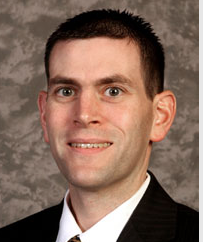By Minami Levonowich
KU Statehouse Wire Service

TOPEKA – A bill that would put the state in charge of refugee resettlements and possibly limit the number of people coming to Kansas has moved one step closer to reality.
The House Committee on Federal and State Affairs last week approved HB 2612. The bill, which now goes to the full House, would establish a state refugee coordinator and allow local governments to postpone refugee resettlements for up to a year if officials believe communities do not have services, such as housing, education and health, to accommodate new residents.
Proponents say the bill will allow local and state governments to coordinate with federal authorities to effectively place refugees in Kansas and will provide a measure of safety for current state residents. Opponents say the bill is unconstitutional and discriminatory.
Rep. Joseph Scapa, R-Wichita, said the bill does not ban refugees but implements a “common sense reporting requirement” in order to take the necessary steps to know who refugees are.
“Protecting our citizens is a primary function of government. It’s not an overreaction,” Scapa said.
The bill also would create a state office for refugees and would authorize Gov. Sam Brownback to appoint a state refugee coordinator. The number of refugees allowed in Kansas would be determined by Brownback in consultation with state agencies.
With Brownback’s authority over state refugees, Rep. Steven Becker, R-Buhler, fears other state officials won’t get a say in decisions.
“It is my understanding that (the bill) gives the governor unilateral authority by executive order to suspend all resettlement of refugees in the state,” Becker said. “If such an executive order is in place, then the state refugee coordinator and local refugee officers don’t have a role to play because there will be no refugees in Kansas.”
Rep. Dick Jones, R-Topeka, said he has serious doubts about the current vetting system and, even though he wants to help the refugees, he also wants to acknowledge the responsibility he has to the citizens of the state. He admits that the bill isn’t perfect, but it does some good in trying to protect Kansas.
Rep. Annie Tietze, D-Topeka, however, feels that the steps taken to admit refugees into the United States are extensive enough and thinks that helping families should be legislators’ main concern.
“It’s not like these people just say, ‘Hey, I want to go (to America), those people are rich and they can help me,’” Tietze said. “These are, as we know, predominantly families – women, children, people who want to come to our country to work.”
In response to the legislative committee’s action, Micah Kubic, executive director of the American Civil Liberties Union of Kansas (ACLU), said he was disappointed with the bill’s passage.
“The bill would deny public services to individuals residing in Kansas based simply on who they are and where they come from,” Kubic said. “Federal law and international treaties both assign sole power over refugee resettlement to the federal government, and this attempt by the state to assign itself some of that power is simply not permitted under the law.”
Rep. Brett Hildabrand, R-Shawnee, struggled with his vote but decided in favor of the bill because he said his faith called for compassion for both refugees and the citizens of Kansas. If government officials don’t find a way to improve the screening process, he said, then they’re being “dis-compassionate” to Kansas residents.
“If this bill banned refugees in the state of Kansas, I would be 100 percent against it. If it banned an entire religion, I would be 100 percent against it,” Hildabrand said. “But that is not what this bill does.”
Part of what the bill does do is evaluate necessary services such as medical care, educational facilities, and affordable housing that will be needed to meet the needs of the anticipated refugee population. The bill will also require quarterly meetings with the state refugee coordinator and representatives of the Kansas districts on any information regarding refugee settlement.
Rep. Jan Pauls, R-Hutchinson, who chairs the House Federal and State Affairs committee, supports the bill and says that it’s a good first step in making sure that communities welcoming refugees have adequate services available.
“This may not be a perfect effort but I would hate to see a tragedy in the future and have it based on the fact that we do not have a good idea on what type of resources we have in communities,” Pauls said.
Last year, Brownback signed an executive order prohibiting state agencies or any organizations receiving state funds from working to assist refugees relocating from Syria to Kansas.
The United States welcomed 1,682 Syrian refugees in 2015, and the federal government plans to admit at least 10,000 more in the 2016 fiscal year. Before entering the country, all refugees go through an intensive security screening that involves law enforcement agencies and the FBI Terrorist Screening Center. The U.S. government prioritizes admitting women, children, and wounded individuals first. The U.S. Department of State said in a news release that it will continue to enhance its screening process for additional security.
Edited by Maddy Mikinski
